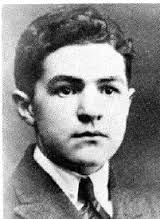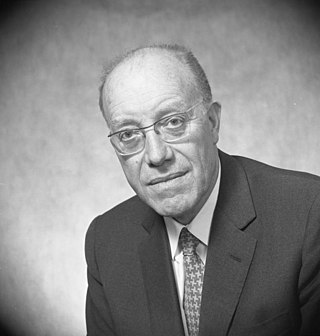Related Research Articles

The European Association for Theoretical Computer Science (EATCS) is an international organization with a European focus, founded in 1972. Its aim is to facilitate the exchange of ideas and results among theoretical computer scientists as well as to stimulate cooperation between the theoretical and the practical community in computer science.

Friedrich Ludwig "Fritz" Bauer was a German pioneer of computer science and professor at the Technical University of Munich.

Mojżesz Presburger, or Prezburger, was a Polish Jewish mathematician, logician, and philosopher. He was a student of Alfred Tarski, Jan Łukasiewicz, Kazimierz Ajdukiewicz, and Kazimierz Kuratowski. He is known for, among other things, having invented Presburger arithmetic as a student in 1929 – a form of arithmetic in which one allows induction but removes multiplication, to obtain a decidable theory.
Venkatesan Guruswami is a senior scientist at the Simons Institute for the Theory of Computing and Professor of EECS and Mathematics at the University of California, Berkeley. He did his high schooling at Padma Seshadri Bala Bhavan in Chennai, India. He completed his undergraduate in Computer Science from IIT Madras and his doctorate from Massachusetts Institute of Technology under the supervision of Madhu Sudan in 2001. After receiving his PhD, he spent a year at UC Berkeley as a Miller Fellow, and then was a member of the faculty at the University of Washington from 2002 to 2009. His primary area of research is computer science, and in particular on error-correcting codes. During 2007–2008, he visited the Institute for Advanced Study as a Member of School of Mathematics. He also visited SCS at Carnegie Mellon University during 2008–09 as a visiting faculty. From July 2009 through December 2020 he was a faculty member in the Computer Science Department in the School of Computer Science at Carnegie Mellon University.
The Heinz Maier-Leibnitz-Preis, in honor and memory of the German physicist Heinz Maier-Leibnitz, is funded by the Bundesministerium für Bildung und Forschung, and it is awarded by a selection committee appointed by the Deutsche Forschungsgemeinschaft and the BMBF. Since 2013, there are ten recipients of the prize and each receives 20,000 Euros, which is an increase over the original 16,000 Euros that had been given to six recipients per year until 2012.

Heinz Maier-Leibnitz was a German physicist. He made contributions to nuclear spectroscopy, coincidence measurement techniques, radioactive tracers for biochemistry and medicine, and neutron optics. He was an influential educator and an advisor to the Federal Republic of Germany on nuclear programs.
The Presburger Award, started in 2010, is awarded each year by the European Association for Theoretical Computer Science (EATCS) to "a young scientist for outstanding contributions in theoretical computer science, documented by a published paper or a series of published papers." The award is named after Mojżesz Presburger who accomplished his path-breaking work on decidability of the theory of addition as a student in 1929.

Mihai Pătrașcu was a Romanian-American computer scientist at AT&T Labs in Florham Park, New Jersey, USA.
Leif Kobbelt is a German university professor for Computer Science with a specialization in Computer Graphics. Since 2001 he is the head of the Institute for Computer Graphics and Multimedia at RWTH Aachen university.

Thomas Lengauer is a German computer scientist and computational biologist.

Friedrich Eisenbrand is a German mathematician and computer scientist. He is a professor at EPFL Lausanne working in discrete mathematics, linear programming, combinatorial optimization and algorithmic geometry of numbers.
Martin Grohe is a German mathematician and computer scientist known for his research on parameterized complexity, mathematical logic, finite model theory, the logic of graphs, database theory, and descriptive complexity theory. He is a University Professor of Computer Science at RWTH Aachen University, where he holds the Chair for Logic and Theory of Discrete Systems.
Kasper Green Larsen is a Danish theoretical computer scientist. He is currently full professor at Aarhus University.
Philipp Kanske is a German psychologist and neuroscientist. He is professor at Technische Universität Dresden. His research focuses on the neuronal foundations of emotion, emotion regulation and emotion understanding, as well as their changes in mental disorders. Philipp Kanske is speaker of the Junge Akademie.
Stefan Roth is a German computer scientist, professor of computer science and dean of the department of computer science of the Technische Universität Darmstadt. He heads the Visual Inference Lab.

Eric Bodden is a German computer scientist. He holds the Chair of Secure Software Engineering at the Heinz Nixdorf Institute of the Paderborn University and is Director of Software Engineering and IT Security at the Fraunhofer Institute for Mechatronic Design (IEM). He is also head of the engineering department in the Collaborative Research Centre 1119 CROSSING at the Technical University of Darmstadt.

Patricia Bouyer-Decitre is a French theoretical computer scientist known for her research on timed automata, model checking, and temporal logic. She is a senior researcher for the French National Centre for Scientific Research (CNRS), and director of the Laboratoire Méthodes Formelles of CNRS and the École normale supérieure Paris-Saclay.
Marc Alexa is a professor of computer science at TU Berlin working in the fields of computer graphics, geometric modeling and geometry processing.
Xi Chen is a computer scientist. He is an associate professor of computer science at Columbia University. Chen won the 2021 Gödel Prize and Fulkerson Prize for his co-authored paper "Complexity of Counting CSP with Complex Weights" with Jin-Yi Cai.
Kai Lawonn is a German computer scientist. He works in the field of exploratory data analysis and visualization and has been a full professor at the University of Jena at the Institute of Computer Science since 2019.
References
- ↑ "Presburger Award". European Association for Theoretical Computer Science.
- ↑ "Heinz Maier-Leibnitz-Preis". German Research Foundation.